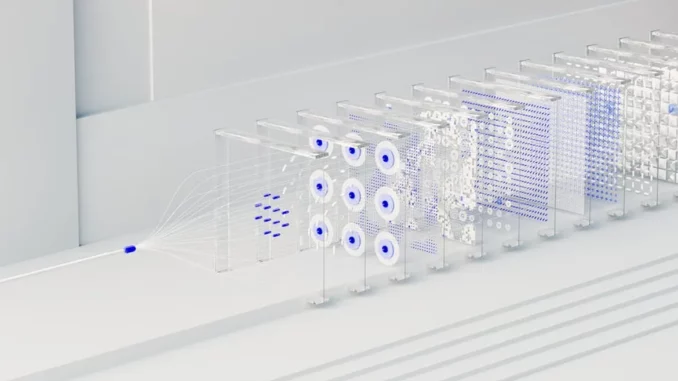
Summary
NCSA Enhances HPC with Revolutionary Storage System
The National Center for Supercomputing Applications (NCSA), in collaboration with VAST Data, has launched Harbor, a state-of-the-art storage solution that significantly improves computational efficiency. This development enhances the capabilities of NCSA’s Delta and DeltaAI supercomputers, marking a transformative leap in high-performance computing (HPC). “Harbor’s deployment has achieved a 400% increase in application launch performance for Delta,” stated J.D. Maloney, Lead HPC Storage Engineer at NCSA. The initiative underscores a pivotal shift towards advanced AI infrastructure, bolstering scientific research and accessibility within the U.S. National Science Foundation’s portfolio.
Main Article
The National Center for Supercomputing Applications (NCSA) has long been a pioneer in the realm of high-performance computing. Its latest initiative, the introduction of Harbor, a cutting-edge storage service, once again sets new benchmarks for computational efficiency and performance. This innovative solution, developed in collaboration with VAST Data, represents a significant upgrade in the storage capabilities of NCSA’s systems, particularly benefiting the Delta and DeltaAI supercomputing resources.
Integration and Impact
At the core of this transformation is the integration of Harbor, which provides expedited storage solutions for global home and software directories across all NCSA open-science resources. The deployment of Harbor has resulted in a remarkable 400% increase in application launch performance for the Delta system. This enhancement is not only a quantitative advancement but also a qualitative shift, redefining how researchers and scientists engage with computational resources.
J.D. Maloney, the Lead HPC Storage Engineer at NCSA, has observed a notable uptick in GPU utilisation among Harbor users over the past two years. This increased utilisation underscores the efficiency and reliability that Harbor, supported by VAST Data’s platform, brings to the table. The consolidation of file systems into a single VAST namespace has been revolutionary, ensuring 100% uptime and delivering a consistent, interactive experience for users.
Collaboration with VAST Data
The collaboration with VAST Data, a leader in advanced AI infrastructure, has not only enhanced performance and data efficiency but also streamlined operations and improved scalability for future growth. Subramanian Kartik, VAST Data Global Systems Engineering Lead, highlighted that the partnership equips NCSA and its users with advanced AI infrastructure that accelerates scientific research across various disciplines. This capability is crucial for processing complex datasets, training AI models, and conducting high-performance simulations, thereby expediting the exploration of new scientific theories and the resolution of complex problems.
As the era of artificial intelligence progresses, the enhancements brought by Harbor and VAST Data position Delta and DeltaAI at the forefront of research computing. Delta is the most performant GPU-computing resource within the U.S. National Science Foundation (NSF) portfolio, with a robust emphasis on AI and machine learning applications. This focus is particularly significant in advancing accessibility for individuals with disabilities in high-performance computing, a testament to NCSA’s commitment to inclusivity and innovation.
Expanding Capabilities with DeltaAI
The advent of DeltaAI is set to quadruple NCSA’s AI-focused computing capacity, significantly expanding the resources available within the NSF-funded advanced computing ecosystem. Bill Gropp, NCSA Director, underscores the transformative potential of DeltaAI, which will provide formidable capabilities for simulation and data science, with a pronounced emphasis on AI support. This expansion responds to the growing demand for AI applications across diverse fields of science and engineering.
Detailed Analysis
The NCSA’s introduction of Harbor is emblematic of a broader trend in high-performance computing towards integrating advanced storage solutions with AI infrastructure. This development reflects the increasing demand for efficient data processing and management in scientific research. The 400% rise in application launch performance for the Delta system is particularly telling of the potential for such innovations to redefine computational capabilities. By consolidating file systems into a single namespace, NCSA not only optimises performance but also ensures a seamless user experience, which is critical in research environments where uptime and reliability are paramount.
Moreover, the partnership with VAST Data highlights a growing recognition of the need for specialised AI infrastructure. As data sets become more complex and AI models increasingly sophisticated, the ability to swiftly process and analyse information becomes a cornerstone of competitive advantage in scientific research. The enhancements at NCSA set a precedent for other institutions seeking to leverage AI for cutting-edge research.
Further Development
Looking ahead, the potential expansion of NCSA’s capabilities with DeltaAI signals an exciting phase in the evolution of high-performance computing. As NCSA continues to push the boundaries of what is possible in AI and machine learning, there is a clear path towards further breakthroughs in scientific research. The sustained collaboration with VAST Data promises ongoing enhancements to infrastructure, potentially leading to novel applications and discoveries.
Readers can expect continued coverage on how NCSA’s advancements impact AI applications across various domains. Stay tuned for updates on the integration of these technologies and their implications for the future of scientific research and computational innovation.

